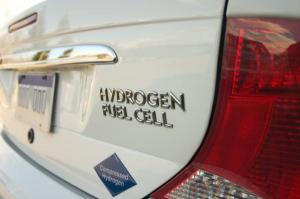
Hydrogen Vehicles Coming Soon? Two Million
Could Be On Roads By 2020
Jul 18, 2008 - ScienceDaily
 |
|
Rear view of a hydrogen fuel cell
car. By 2023, the total cost of fuel cell vehicles,
including the cost of hydrogen fuel over a vehicle's
lifetime, could become competitive with conventional
vehicles.
(Credit: iStockphoto/Gene Chutka)
|
A transition to hydrogen vehicles could greatly reduce
U.S. oil dependence and carbon dioxide emissions, says a
new congressionally mandated report from the National Research
Council, but making hydrogen vehicles competitive in the
automotive market will not be easy. While the development
of fuel cell and hydrogen production technology over the
past several years has been impressive, challenges remain.
Vehicle costs are high, and the U.S. currently lacks the
infrastructure to produce and widely distribute hydrogen
to consumers. These obstacles could be overcome, however,
with continued support for research and development and
firm commitments from the automotive industry and the federal
government, concluded the committee that wrote the report.
Light-duty vehicles, such as cars, SUVs, and pickup trucks,
are responsible for 44 percent of the oil used in the United
States and over 20 percent of the carbon dioxide emitted.
Concerns over climate change, oil imports, and recent spikes
in gasoline prices have spurred interest in the development
of alternative fuels. In 2003, President Bush announced
a $1.2 billion initiative to encourage development of hydrogen
production technology and fuel cell vehicles, which are
powered through a chemical reaction between hydrogen and
oxygen and emit only water and heat as exhaust.
The committee estimated the maximum number of hydrogen
vehicles that could be on the road in the coming decades,
assuming that practical technical goals are met, that consumers
want hydrogen cars, and that government policies are in
place to help drive the transition from oil to hydrogen
fuel. The findings therefore represent potential best-case
scenarios rather than predictions.
According to the committee, it will take many years before
hydrogen vehicles will significantly penetrate the light-duty
fleet, even though technological developments have been
progressing rapidly. Production of hydrogen vehicles could
increase significantly by 2015. At this stage, their cost
-- although dropping rapidly -- would still need to be heavily
subsidized for consumers.
The maximum practicable number of hydrogen vehicles that
could be on the road by 2020 is 2 million, says the report.
By 2023, the total cost of fuel cell vehicles, including
the cost of hydrogen fuel over a vehicle's lifetime, could
become competitive with conventional vehicles. At that point,
the number of hydrogen vehicles on the road could grow rapidly,
to nearly 60 million in 2035 and 200 million by 2050.
The committee also calculated the investments, both public
and private, that would be needed to make a complete transition
from oil to hydrogen fuel. These costs include research
and development, vehicle deployment, and establishing infrastructure.
According to the committee, government support via strong
policy initiatives as well as funding would be needed until
at least 2023. The cost to the government would be about
$55 billion between 2008 and 2023; private industry would
be expected to invest $145 billion over that same time period.
To put these numbers into perspective, the government subsidy
for ethanol fuel could grow to $15 billion per year by 2020.
The shift toward hydrogen fuel would not have a large impact
on oil usage or greenhouse gas emissions until hydrogen
vehicles make up a significant portion of the market. If
hydrogen vehicles eventually took over the market, there
would be great decreases in both, although the overall effect
on greenhouse gas emissions would depend upon how the hydrogen
fuel was produced. The committee compared these reductions
with those that might be achieved by either improving the
fuel efficiency of conventional vehicles or by converting
to biofuels. Because they can be implemented more rapidly,
both of these options could produce reductions in oil use
and emissions faster than hydrogen, but after about 2040,
hydrogen would become more effective.
The greatest possible reductions would occur if biofuels,
fuel-efficient conventional vehicles, and hydrogen vehicles
are all pursued simultaneously, rather than seen as competitors.
This "portfolio approach," if accompanied by government
policies driving a transition toward reduced oil use and
low-carbon fuels, could reduce greenhouse gas emissions
from cars and trucks to less than 20 percent of current
levels and could nearly eliminate oil demand for these vehicles
by 2050, the committee said.
The study was sponsored by the U.S. Department of Energy.
The National Academy of Sciences, National Academy of Engineering,
Institute of Medicine, and National Research Council are
private, nonprofit institutions that provide science, technology,
and health policy advice under a congressional charter.
The National Research Council is the principal operating
agency of the National Academy of Sciences and the National
Academy of Engineering.
The report is entitled "Transitions To Alternative Transportation
Technologies: A Focus On Hydrogen."

|